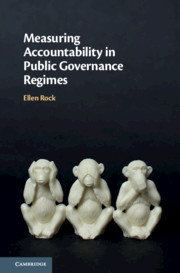Refine search
Actions for selected content:
7 results
Part I - Accountability Deficits and Overloads
-
- Book:
- Measuring Accountability in Public Governance Regimes
- Published online:
- 28 September 2020
- Print publication:
- 01 October 2020, pp 11-36
-
- Chapter
- Export citation
Introduction
-
- Book:
- Measuring Accountability in Public Governance Regimes
- Published online:
- 28 September 2020
- Print publication:
- 01 October 2020, pp 1-10
-
- Chapter
- Export citation
2 - Too Little or Too Much of a Good Thing?
- from Part I - Accountability Deficits and Overloads
-
- Book:
- Measuring Accountability in Public Governance Regimes
- Published online:
- 28 September 2020
- Print publication:
- 01 October 2020, pp 25-36
-
- Chapter
- Export citation
Part II - Benchmark of Accountability
-
- Book:
- Measuring Accountability in Public Governance Regimes
- Published online:
- 28 September 2020
- Print publication:
- 01 October 2020, pp 37-212
-
- Chapter
- Export citation
1 - Defining Accountability
- from Part I - Accountability Deficits and Overloads
-
- Book:
- Measuring Accountability in Public Governance Regimes
- Published online:
- 28 September 2020
- Print publication:
- 01 October 2020, pp 13-24
-
- Chapter
- Export citation
Conclusion
-
- Book:
- Measuring Accountability in Public Governance Regimes
- Published online:
- 28 September 2020
- Print publication:
- 01 October 2020, pp 273-277
-
- Chapter
- Export citation

Measuring Accountability in Public Governance Regimes
-
- Published online:
- 28 September 2020
- Print publication:
- 01 October 2020
